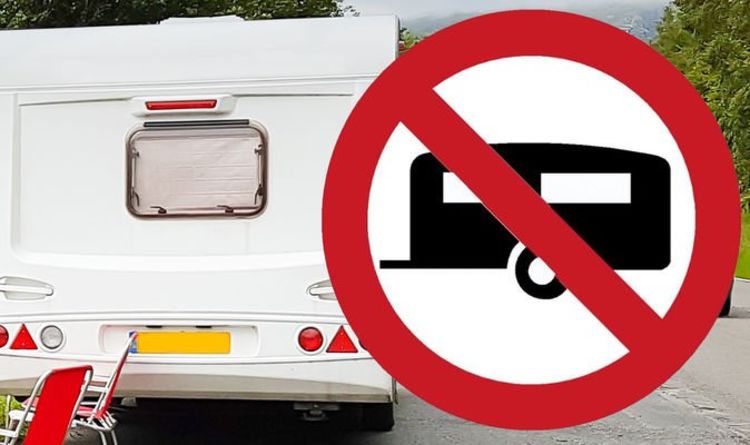Caravan Encampments Fuel "Ghetto" Fears In UK City

Table of Contents
The Rise of Unauthorised Caravan Encampments in UK Cities
The number of unauthorised caravan encampments across UK cities is steadily rising, leading to increased tension and conflict. This increase isn't geographically uniform; some cities experience significantly more encampments than others. Several factors contribute to this trend:
- Severe Housing Shortage: The UK faces a significant housing crisis, particularly in affordable housing. This lack of options forces vulnerable individuals and families, including traveller communities, to seek alternative accommodation.
- Inadequate Provision of Traveller Sites: A persistent shortage of official and properly resourced traveller sites leaves many with no legal place to live. This shortage fuels the increase in unauthorised encampments.
- Economic Hardship: Economic instability and poverty can also contribute to the rise of unauthorised encampments, as individuals and families struggle to afford traditional housing.
Here are some examples illustrating the scale of the problem:
- Manchester: Experienced a 30% increase in unauthorised encampments in the last year.
- London: Reports a significant rise in encampments across multiple boroughs, straining local resources.
- Birmingham: Faces ongoing challenges managing unauthorised encampments and balancing community concerns with traveller rights.
These statistics highlight the urgent need for comprehensive solutions that address both the immediate issue of illegal encampments and the underlying causes. Local authorities grapple with balancing legal frameworks, planning permission processes, and the practical challenges of managing these situations effectively.
Community Concerns and "Ghetto" Perceptions
The emergence of unauthorised caravan encampments often leads to significant anxieties among local residents. The term "ghetto," frequently used in this context, carries heavily negative connotations and fuels fear and prejudice. These concerns often centre on:
- Increased Rubbish and Environmental Issues: Improper waste disposal can lead to environmental problems and health concerns.
- Fear of Crime: While not inherently linked to traveller communities, fear of crime is often exacerbated by the presence of encampments.
- Disruption to Local Businesses: Encampments can sometimes affect local businesses, leading to concerns about trade and access.
- Loss of Amenity: Parks and green spaces used by unauthorised encampments can be rendered unusable for local residents.
It's crucial to acknowledge these concerns while also critically examining the validity and potential exaggeration of these fears. Media portrayal and pre-existing social stigma often play a significant role in shaping public perception. Addressing these issues requires open communication, accurate information, and a focus on factual data rather than relying on stereotypes.
The Role of Local Authorities and Government Policies
Local councils and central government play a crucial role in addressing the issue of unauthorised encampments. However, navigating the complexities of legal frameworks and balancing community concerns with traveller rights presents significant challenges. Current policies often focus on:
- Eviction Procedures: Local authorities frequently use legal processes to evict unauthorised encampments, which can be lengthy and resource-intensive.
- Limited Resources: Councils often lack the resources needed to effectively manage encampments, clean up sites, and support those involved.
- Legal Frameworks: The legal frameworks governing traveller sites and unauthorised encampments are complex and sometimes contradictory.
More effective strategies are needed, including:
- Increased Provision of Authorised Traveller Sites: Creating more suitable and appropriately resourced traveller sites is crucial to reduce the reliance on illegal encampments.
- Investment in Affordable Housing: Addressing the underlying housing crisis will help reduce the number of people forced to seek alternative accommodation.
- Improved Communication and Community Engagement: Open communication and engagement with both residents and traveller communities can help alleviate tensions and build understanding.
Addressing the Underlying Social Issues
The problem of unauthorised caravan encampments is deeply intertwined with broader societal issues. Poverty, lack of affordable housing, and social inequality are all significant contributing factors. Therefore, effective solutions must move beyond simply addressing the symptoms and focus on tackling the root causes:
- Tackling Social Inequality: Addressing income disparities and improving access to education and employment will contribute to reducing poverty and homelessness.
- Investment in Affordable Housing: A significant investment in affordable housing options is essential to provide alternatives for those currently without adequate accommodation.
- Promoting Community Integration: Initiatives aimed at fostering understanding and integration between different communities will help break down stereotypes and improve social cohesion.
Empathy, understanding, and a commitment to inclusive solutions are critical to tackling this complex issue. Focussing solely on punitive measures ignores the social and economic factors that contribute to the problem.
Conclusion: Finding Solutions for Caravan Encampments and Addressing "Ghetto" Fears
The rise of unauthorised caravan encampments in UK cities is a complex issue stemming from a combination of social, economic, and political factors. Local authorities and residents face significant challenges in managing these encampments while addressing the concerns of all involved. The frequent use of the term "ghetto" highlights the deep-seated anxieties and prejudices that complicate efforts to find effective and just solutions.
Addressing this issue demands a multi-faceted approach. This requires increasing the provision of authorised traveller sites, investing in affordable housing, strengthening legal frameworks, and promoting open dialogue and understanding between communities. We must challenge negative stereotypes, engage in constructive dialogue, and support initiatives aimed at creating sustainable solutions for everyone. Let's work together to create a future where everyone has access to safe, secure, and affordable housing, thereby reducing the need for unauthorised caravan encampments and dismantling the harmful "ghetto" narrative. Let's build a more equitable and inclusive society for all.

Featured Posts
-
 Complete Guide To Nyt Strands Game 405 April 12th Saturday
May 10, 2025
Complete Guide To Nyt Strands Game 405 April 12th Saturday
May 10, 2025 -
 Hurun Report 2025 Elon Musks Billions Reduced But Maintains Top Spot
May 10, 2025
Hurun Report 2025 Elon Musks Billions Reduced But Maintains Top Spot
May 10, 2025 -
 Trumps Threats Greenlands Closer Ties With Denmark
May 10, 2025
Trumps Threats Greenlands Closer Ties With Denmark
May 10, 2025 -
 Nottingham Hospital Data Breach Families Anger Over Access To A And E Records
May 10, 2025
Nottingham Hospital Data Breach Families Anger Over Access To A And E Records
May 10, 2025 -
 Updated Palantir Stock Price Projections Analyst Revisions Explained
May 10, 2025
Updated Palantir Stock Price Projections Analyst Revisions Explained
May 10, 2025
